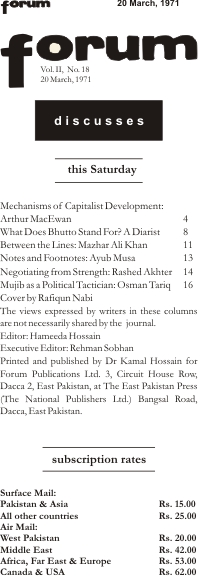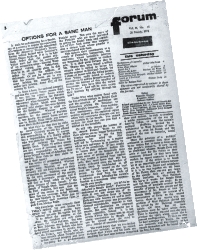
Inside
|
Options for a sane man It must be embarrassing for a President of a country to require the equivalent of a brigade to ensure his safe transmittal from the Airport to President's House. Sitting behind barbed wires President's House, Dacca looks as if it is in Khe Sanh rather than the garden city. Yahya must feel like the commander of an occupation army -- General Westmoreland visiting his battle-front. Can he in all sincerity claim in this milieu to speak for millions of Pakistanis. Or can he seriously claim that his security forces are in any sense holding the country together rather than holding down 55% of the country by force. Is force a basis for national integrity and can the armed forces ensure this? It was not the armed forces which created Pakistan. During the Pakistan Movement when thousands of Bengalis including Sheikh Mujib were facing jail and lathi charges they were fighting for the British Empire in other ex-colonial territories. Whoever made sacrifices for the creation of Pakistan it was hardly the armed forces and no one in Bangla Desh needs any lectures from them on the concept of Pakistan.
The notion of preserving nationhood at gunpoint lies shattered. Whether people want Pakistan or not they certainly will not have it thrust on them at bayonet point. Pakistan was made by the mass movement of the people, through a democratic struggle, and it will stay or break solely on the freely given consent of these people. If the people of Bangla Desh, formerly known as East Pakistan, feel now that the price of one nation is too heavy to bear they are sovereign to bid farewell to their brothers in the West just as they exercised their sovereign right to part from Mother India. This knowledge must seriously limit Yahya's options. He now knows for certain that 75 million people have repudiated not only his regime but his right to defend the integrity of the nation. He therefore can only claim to speak for West Pakistan. But who in West Pakistan wants his regime as spokesman? Not the Baluch who have faced armed repression in Ayub's days. Not the Pathan and Sindhi who are more worried about Punjabi colonialism than national integrity and have little sympathy for a predominantly Punjabi army. Not even the mass of the Punjabis who are more interested in getting the feudal lords and capitalists off their back rather than suppressing a distant land, whose plunder is not even shared with them. This reduces their constituency to a coterie of Zamindars, bureaucrats, and capitalists whose immediate interests are threatened by the return to civilian rule. It is their good fortune that in Mr Bhutto they have found a willing catspaw who is willing to barter his popular support in Sind and Punjab for a share of power with the ruling groups. Does Yahya really intend to unleash genocide on 75 million Bengalis merely to protect the interest of this handful of buccaneers who have bled the nation for 23 years? And will he even secure their interests by carrying through his task? Today West wing traders faced with the loss of their markets in Bangladesh and the cessation of remittances are themselves cabling the President to accept Mujib's demands. Even exploitation presupposes some element of popular support in the exploited region where local comprador elements can act as conduits to the people. You cannot exploit the dead nor can you find a market on the battlefield. Or will this protect the interest of the Armed Forces? Taxes to pay their salaries are no longer forthcoming. Foreign exchange to pay for their hardware has dried up. Nor will aid be forthcoming to a regime whose very legitimacy is in question by 55% of its population. If they sought to secure their defence budget this must be one of the historically most inept ways of getting about the job. If they sought a second front against India they must know that this has totally collapsed since the borders of Bangla Desh lie undefended as all guns are turned inward on the local people. In this time the army has transformed itself from the role of a national army defending the nation's borders to a mercenary army suppressing its own people.
The wold hopes that we are dealing with sane men and we have no reason to think that Yahya and his junta are anything less than sane however misguided their past actions. In such a situation a public renunciation of the use of force by Yahya to solve the nation's political problems, backed by a withdrawal to West Pakistan of units pumped in since 1st March and the return of the rest to barracks, would clear the air. Once the principle of a political settlement is accepted then there can be no option but to come to terms with the people's demands. It now has to be confirmed whether Bangla Desh will settle at least for Six Points as their minimum demand or they have been pushed by recent events to a point of no return. If the nation is to break, let it go peacefully and without bitterness to live as a friend and neighbour. If it is to stay together on the basis of Six Points, then one can get down to the specific task of making Six Points workable in West Pakistan. We know it works for Bangladesh and the blue prints are ready. In an atmosphere of goodwill created by the transfer of power to the people and the acceptance of Six Points in toto for Bangladesh within the context of a renunciation of force by the armed forces, there is no reason why the problem of West Pakistan should not be solved by the National Assembly within 120 days. But all these decisions must be taken within days. Time is running out and each day may produce the spark which could fire a general conflagration. There is no time for half measures by Yahya. He must act decisively and immediately or the people themselves will be forced to take the fatal last step. |
 By what right do they then lay claim to custodianship of the integrity of Pakistan? Certainly no one has offered this responsibility to them. If anyone has a responsibility it is Sheikh Mujib who was given the charge by 75 million people of realising Six Points for Bangla Desh. These 75 million people are not aware of investing any corresponding responsibility on the armed forces beyond the task of defending their borders. How then do they claim to act in their name?
By what right do they then lay claim to custodianship of the integrity of Pakistan? Certainly no one has offered this responsibility to them. If anyone has a responsibility it is Sheikh Mujib who was given the charge by 75 million people of realising Six Points for Bangla Desh. These 75 million people are not aware of investing any corresponding responsibility on the armed forces beyond the task of defending their borders. How then do they claim to act in their name? So what interests then are left to be defended in Bangla Desh? Force as an instrument of policy is now meaningless since it can not secure any of its objectives. Therefore force in Bangladesh can only become an end in itself. Modern weaponry gives any psychopathic General considerable capacity to visit death and destruction on unarmed people. But even this exercise has a finite capability. Indeed it is not certain if even this army with its mixed ethnic composition in Bangladesh can be carried along the road to mass murder of unarmed civilians.
So what interests then are left to be defended in Bangla Desh? Force as an instrument of policy is now meaningless since it can not secure any of its objectives. Therefore force in Bangladesh can only become an end in itself. Modern weaponry gives any psychopathic General considerable capacity to visit death and destruction on unarmed people. But even this exercise has a finite capability. Indeed it is not certain if even this army with its mixed ethnic composition in Bangladesh can be carried along the road to mass murder of unarmed civilians.